

South
Crisis An in-depth feature on MAF’s response
years of MAF in Arnhem Land Celebrating 50 years of impact
The
Sudan
50
Slippery
Pilot,
most difficult
The Short, the Steep & the
Kiwi
Bridget, describes MAF’s
airstrips
www.maf.org.nz
info@maf.org.nz
0800 87 85 88
MAF (Mission Aviation Fellowship) is a Christian organisation reaching men, women and children in more than 25 countries. Operating 120 aircraft, MAF’s pilots overcome terrain that has become inaccessible due to derelict roads, natural disaster, or violent conflict. MAF aircraft service more than 1,000 destinations - transporting food, water, health professionals, medical supplies, emergency workers and Christian missionaries where they are needed most. Each flight brings practical help, spiritual hope and physical healing to thousands of isolated people in remote communities for whom flying is a lifeline not a luxury. MAF is flying for life
Front cover
MAF is flying for life in South Sudan

Jenny Davies
Back cover
MAF is flying for life in Papua New Guinea
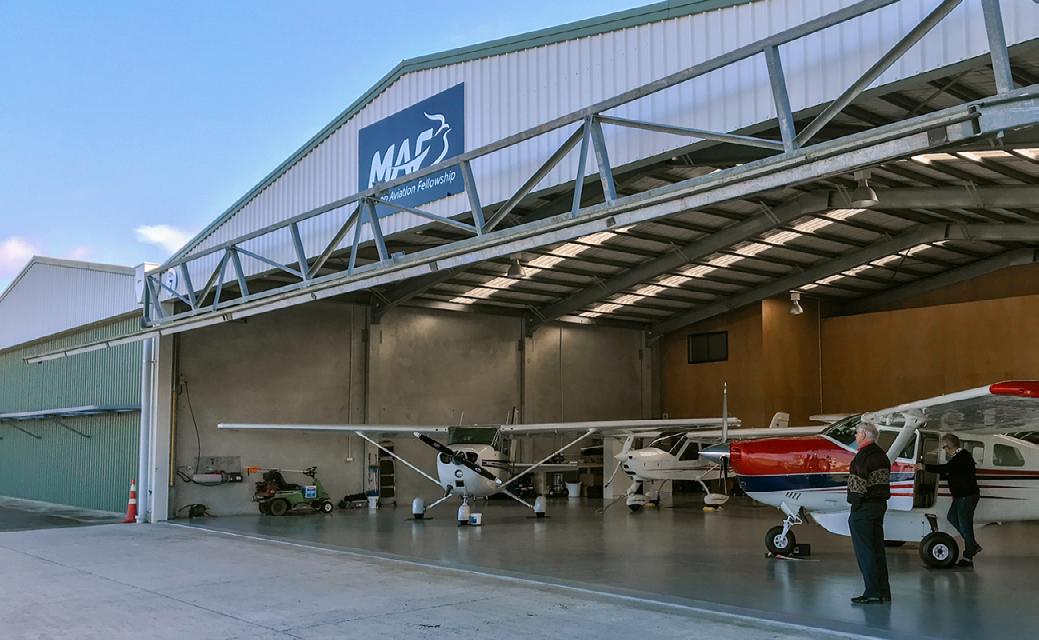
Annelie Edsmyr
Flying for Life Magazine NZ
Editor: Zoë Davies
Email: comms@maf.org.nz
Copy Editors: Zoë Davies, Jane Eddy, & Abigail Vincent
Designer: Zoë Davies
Printer: Roe Print Services
©MAF NZ Spring 2023
MAF NZ
www.maf.org.nz
info@maf.org.nz
0800 87 85 88
PO Box 76502
Auckland 2241
New Zealand
Registered charity in New Zealand.
Bring
Open hours: 9am-5pm | Monday - Friday Plan your visit by emailing us at info@maf.org.nz
We look forward to hosting you.
- Mark Fox, CEO
We invite you to visit our recently completed MAF NZ Kendon-Strong Centre, located at Tauranga Airport.
your family, friends, colleagues, or Church group to meet our team, see our plane, and
hear more about the impact of MAF around the world.
the MAF
Visit
Hangar
It could be the most challenging job in PNG. Meet the man who has a vital role in bringing hope to isolated people.
Serve
See our current recruitment opportunities.
A Home of Hope
15 17 19
For four decades, Angelika Wohlenberg has dedicated her life to living and working among the Maasai community.

Caring for new Mothers and babies through ‘Closing the Loop’ in Timor Leste.
13 SPRING 23 / Flying for Life | 2
Mama Maasai
PHOTO / JEAN BIZIMANA
and Baby Darius
Mana
MAF News Brief and Events Current MAF International news, and upcoming MAF NZ events. Contents The South Sudan Crisis MAF’s response to the refugee crisis at the border of Sudan & South Sudan. 3 Celebrating 50 Years in Arnhem Land
more about the unqiue ways MAF serves the people of Arnhem Land. 7 The Short, the Steep and the Slippery Kiwi MAF Pilot, Bridget Ingham, describes what it’s like take off and land on some of the worlds most difficult airstrips. 9
the Vision
Learn
Fueling
11
With MAF
12
How an MAF employee stepped out to build an orphanage for Children impacted by tribal violence in Papua New Guinea.
THE SOUTH SUDAN CRISIS

THE ISSUE
On the 15th of April 2023, in Sudan’s capital Khartoum, conflict ignited between generals Abdel Fattah al-Burhan, the head of the armed forces and his deputy and leader of the RSF, Gen Mohamed Hamdan Dagalo. The fighting triggered a humanitarian crisis, which until now, has displaced 1.4 million people.
Renk, a town at the northernmost point of the South Sudan border, has become the epicentre of a refugee crisis. Over the last three months, MAF has partnered with numerous humanitarian organisations managing a Transit Camp in Renk. Together, the organisations are working to meet refugees’ basic needs as they wait to be transported to their place of origin.
On the journey to the South Sudan border, many have been attacked, lost family members, and been robbed of all their possessions. Having narrowly escaped death, they arrive to the safety of Renk but also to the reality of a life as decimated as the city they left. Renk is a solemn waiting room for those who may never reach their homes again.
Every day, around 2,000 people cross South Sudan’s northern borders seeking refuge. 70% of refugees are entering through the border point of Renk, arriving on trucks or donkey carts after a gruelling two-day journey. Sometimes, the journey alone is enough to steal a life. A team from Citizen’s Call experienced this first-hand when a child in front of them died from dehydration and hunger. Exhausted and traumatised by her escape from Khartoum, the desperate young mother arrived in Renk only to face a new kind of heartbreak as she cradled her only child.
3 | Flying for Life
23 www.maf.org.nz
PHOTO / DAMALIE HIRWA
/ SPRING
The transit camp is overcrowded with exhausted refugees arriving faster than services can be established to support them. Concern South Sudan Managing Director Dr Paul Gal Atem explains,
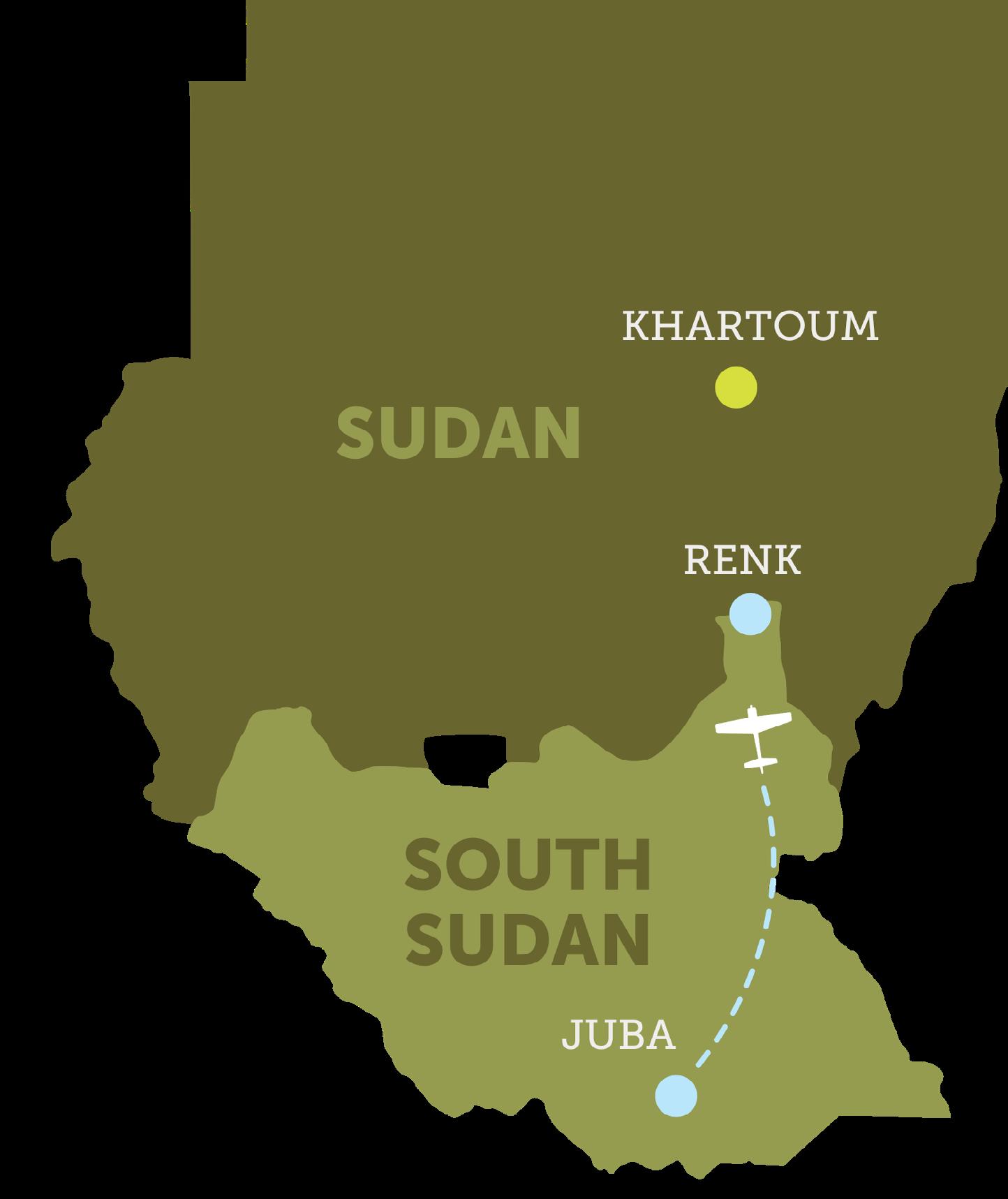
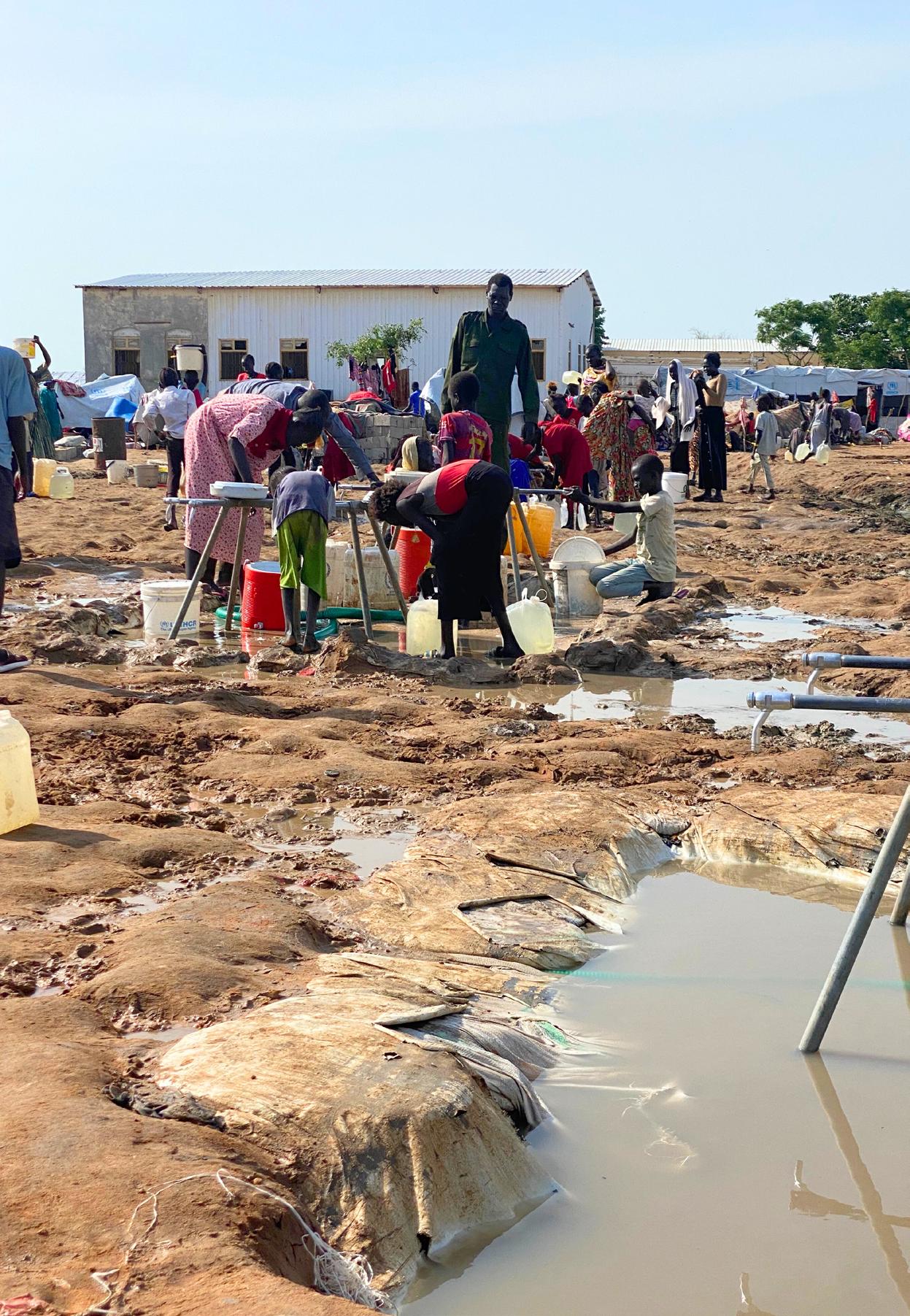
Organisations are working continuously to provide food, water, toilet facilities and transport, but sickness and shelter are the most pressing concerns.
The wet season has rapidly advanced the spread of sickness and caused havoc in trying to provide adequate shelter. As CordAid Humanitarian Aid Programme Manager Bashir James explains, ‘Children and the elderly face the severe impact of the rains because they are prone to pneumonia.’ Measles and malaria have also spread throughout the camp and the surrounding areas. CordAid Country Director, Tom Otieno, adds ‘there is a high chance of getting cholera in a camp with limited sanitation facilities, where people are openly defecating, the defecate matter goes into the water supply when it rains. People who don’t have access to water will drink anything that comes their way.’
Tom recalls the experience of one refugee who was just grateful to reach a place of safety: ‘The lady who arrived two days before, said it was the first time she slept without worrying about gunshots or bombs dropping. She slept outside but still felt relief that no-one is trying to kill her anymore. Even amid all the problems in the camp she felt relief,’ Tom reflects incredulously.
‘That was really touching. It reminded me that peace is priceless. You cannot put a value on peace. If you take peace for granted, you don’t know what war can do.’
- Tom, Cordaid
SPRING 23 / Flying for Life | 4
‘The number is big. People were not expected to arrive in such high numbers, and what was given is not enough even for those who have come.’’
PHOTO / JENNY DAVIES
THE RESPONSE
Getting food and medicine to the people in Renk is becoming increasingly vital. Soaring prices at the market reflects the trade route bringing supplies from Sudan has all but dried up. Meanwhile, the muddy wet-season roads will continue to stop trucks for at least the next five months. River barges at the river ports along the Nile require armed escorts to ensure safe passage of people and freight heading south from Malakal. Renk is six hundred exceptionally long miles from South Sudan’s capital Juba if you are travelling by boat or by road.
In comparison, the 3-hour flight for a MAF plane has been essential in transporting food, medicine, equipment, and people. Although it is usually a straightforward flight, Andy MacDonald explains how the storms and rain have made the flights challenging to navigate and extremely taxing for pilots.
Our MAF Pilots have been putting in extra hours as they keep up with their usual flying commitments while also flying supplies and people to Renk. As a MAF pilot, loading and unloading cargo is bread and butter work, there is little time for reflection as Andy explains. ‘Single crew operations keep the pilots focused on the ground. Afterwards, when you have time to stop and reflect on the reality facing the people, you realise how much the boxes of food and medicine are needed. These supplies benefit people, like refugees camping in the bushes towards the end of the runway looking for a way to leave this nightmare behind.’
‘The boxes of cargo I unloaded were an equal split of medicine and therapeutic food that will meet the needs of people in some of the camps in Renk Town where refugees live alongside the host community. The sachets will be given to children. Each sachet, made from peanuts, milk and whey protein, provides exactly 500 calories of nutrition to a child over 6 months old suffering from Severe Acute Malnutrition. One box containing around 150 sachets will treat one child for the 6-8 weeks as it takes this long for them to recover. It may not seem like much, but ten boxes will help ten vulnerable children survive a conflict they are too young to understand. That is about the number of passengers we can evacuate on a flight.’
THE NEXT STEPS
MAF’s Disaster Response team, led by Director Vaughan Woodward, have been spearheading MAF’s response. They are a team of professionals, ready to go 24-48 hours after a crisis. This includes overseeing the strategic use of money and materials to ensure the most effective response. Vaughan explains, “The MAF South Sudan team have been working with their partner NGOs to assess the needs in this crisis and with MAF Disaster Response, have prepared a response that makes good use of our aircraft and the skills of the MAF team. The scale of the crisis is large, but there is an opportunity for MAF to have an impact in meeting some of the needs.”

The funding, supported by contributions made through MAF resourcing groups as well as a grant from the Swiss Agency for Development and Cooperation (SDC), has allowed MAF to meet a considerable need for flights at a critical time.
The subsidised flights that MAF provided were able to bridge the time-gap, allowing the responding agencies to help those in need, while working to secure ongoing funding for the response.

5 | Flying for Life / SPRING 23 www.maf.org.nz
‘That a three-hour flight is the safest and easiest option speaks volumes about the size of the challenges facing the people in Renk,’ he reflects.
KIWI PILOTS ANDREW MACDONALD (LEFT) & JONATHAN POUND (BELOW)
“I find it very rewarding. I’m just overjoyed to be part of the process of bringing refugees to safety. Flights like this are part of the reason I became a pilot in the first place. I love the fact we could fill the plane right up with people. No spare seats!”
- JONO POUND
PHOTO / DIVYAN AHIMAZ
PHOTO / JENNY DAVIES
“MAF’s agility and early response has helped to ‘prime the pump’ for ongoing relief activities. The time savings enabled by MAF’s aircraft means that help has been delivered in hours rather than in days or weeks compared to overland travel.” says Vaughan.


“We are grateful for the support from SDC and MAF resourcing groups, which enabled us to respond quickly during this period. An initial grant supplied to MAF for a package of flights has been completed, but MAF’s flights will continue to provide a service for organisations providing relief. If funding continues to come in, MAF can offer more subsidised flights to the national NGOs who lack access to international funding streams, to assist them to respond to the ongoing crisis,” says Vaughan.
The national and international NGOs using the flights included Citizen’s Call/ERRI, Cordaid, MSF Belgium, IOM, Episcopal Church of South Sudan, and Caritas South Sudan.
MAF flights, forming part of this intervention, carried 194 passengers over 33 flights.
During 99.3 flying hours, a total of 26.8 tons of cargo were airlifted.
Organisations working on the ground with refugees have been successful in moving large numbers of people onwards from Renk, but the tide of displaced people means the need will likely remain for some time to come. Although there are Sudanese refugees looking for a way out of the conflict, many are South Sudanese people returning due to the violence.
Conditions on the ground in Renk are being made worse by the wet season, which continues until October.
MAF will continue to support the aid efforts in Renk, as part of its South Sudan operations, as we seek to bring help, hope and healing to the people who need it most.
“Honestly, we just want to appreciate MAF. Yesterday, we saw first-hand your mission of flying for life, we really appreciate it. Tobias is a very experienced pilot who understands his trade. It was an honour flying with him to Renk. MAF are contributing to this response and that cannot be underestimated. You are doing so much. We really appreciate it and are proud to be associated with MAF. Let us continue saving lives because that is what we do best at Cordaid.”
STORY / JENNY DAVIES, ELISABETH HALL. EDITED BY / ZOE DAVIES & ABIGAIL VINCENT.
- TOM, CORDAID COUNTRY DIRECTOR
PHOTO / LUANNE CADD
SPRING 23 / Flying for Life | 6
PHOTO / JENNY DAVIES
50 YEARS ARNHEM

Having spent the past 50 years earning appreciation, trust and respect amongst the Indigenous Yolngu people groups of Arnhem Land, MAF has become part of the community in this bold and beautiful land. MAF carries out an essential aviation service with permanent access to this region, which is strictly controlled to protect the traditional Indigenous communities. Access to basic healthcare, fresh produce and economic opportunities is restricted for many Yolngu homelands, and MAF is working to bring about development, education, and hope.
“There are so many things that are rewarding about working for MAF in Arnhem Land. Flying is adventurous and the place is beautiful. A lot of the places we go, we only get there because we’re with MAF. It’s really by invitation only that we can come to these types of places. Here, people are such a part of the land. And once you become part of that and you’re adopted into that, you actually have a place in their family. And it’s incredibly rewarding to build on those relationships and to see them continue.”
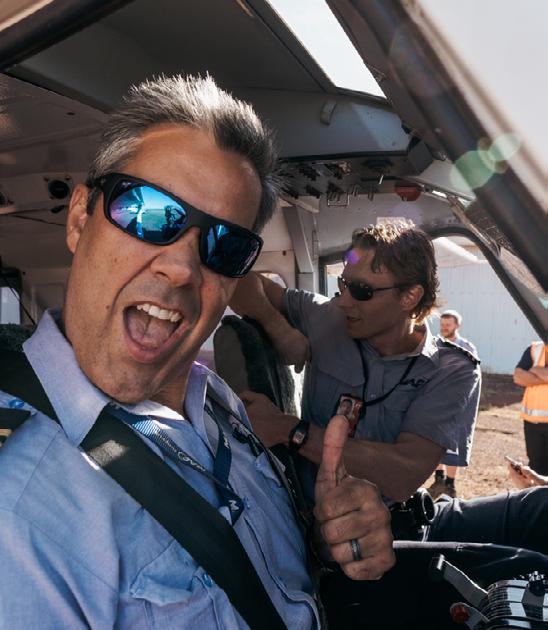
 - MATT HENDERSON, MAF Arnhem Land Country Director
- MATT HENDERSON, MAF Arnhem Land Country Director
“Many of the traditional homelands are separated by vast distances. Many of the Yolgnu communities don’t have the resources to cross these distances, creating isolation. Services that might be considered mundane in most parts of Australia are precious resources in Arnhem Land. MAF provides an essential service to these remote communities where air transport is the only way to overcome barriers to reach vital services. A lot of the places MAF serves are by invitation only, and after five decades in these communities, we’ve been able to help establish a network of access. Today, MAF services 50+ airstrips across Arnhem Land.”
– Kelvin Maistry, Interim MAF Australia General Manager.
7 | Flying for Life / SPRING 23 www.maf.org.nz
PHOTO / LUKAS SCHMID
SERVICES MAF PROVIDES:


• MAF’s scheduled shuttle service flies to the 5 largest remote communities every weekday and is the only air operator in the region to offer this service. This is a cost-effective option for the public. MAF aircraft are also available to charter, giving customers the ability to choose destination and time of departure.
• MAF aircraft provide medevacs to homelands that cannot be accessed by larger medevac aircraft in the region.
• MAF has developed a strong working partnership with domestic violence shelters that offer a haven to victims in the East Arnhem region. MAF provides fast, timely evacuation of these women and children living in remote communities.

• Education flights are an essential operating service to transport young people to school. Without them, the distance to access education is too great. Thanks to these education flights, more and more Arnhem Land students are finishing year 12 and pursuing higher education.
• Isolation disrupts the local church from offering support, encouragement, and training to its people. MAF supports these churches and partners in their work by flying them in and out of remote communities.
• Our Technology Services team is able to provide MicroSD cards for mobile phones, which contain Christian resources and share the Gospel by texting Bible verses.
2 C208 AIRCRAFT

5 GA8 AIRCRAFT
9,847 PASSENGERS
2,497 HOURS TOTAL FLIGHT TIME


5,206 FLIGHT LEGS

50+ DESTINATIONS


451,588KM TOTAL DISTANCE FLOWN
34 MEDEVACS
SPRING 23 / Flying for Life | 8
THE SHORT, THE STEEP & THE SLIPPERY
Kiwi MAF pilot Bridget Ingham shares her recently completed Advanced Airstrip Training, landing at some of the most challenging bush airstrips in the highlands.


Dramatic music plays as the camera follows a small plane weaving in and out of clouds, flying between steep forested hills. A few seconds later, a clearing appears, except it’s not a clearing - it’s an airstrip, perched on the side of a mountain and only slightly longer than it is wide. The plane somehow lands on the postage stamp of grass, the picture fades to black, and the MAF logo appears...
Most of us have seen the promotional videos, now it was my turn to learn how to land on the kinds of airstrips that feature in them and make ‘normal’ pilots gasp in horror!
In MAF PNG, the airstrips are graded from A to D in difficulty. Up until now I have only been trained at A, B and C strips. If an airstrip is less than 500m long, and/or more than 10% slope, it is automatically classified as a D. The flight operations manager can also designate any airstrip as a D if the circuit, prevailing wind, or surface makes it tricky.
The Goroka base services a number of such airstrips. So it was arranged for me to go to Goroka for advanced airstrip training.
The goal of the course was to develop the skills, confidence and precision to land on short airstrips (precision), steep airstrips (technique) and others with challenging circuits or surface conditions (e.g. slippery).
Over the course of four days, we went to 14 different airstrips, each one presenting different challenges - unusual circuits (some of which I was given the challenge of figuring out myself without looking at the airstrip diagram), steep slopes, rough and/or slippery surfaces (which makes taxiing just as much a challenge as landing and taking off).
9 | Flying for Life / SPRING 23 www.maf.org.nz
STORY / BRIDGET INGHAM
PHOTO / LANDEN KELLY
PAPUA NEW GUINEA
PHOTO / LANDEN KELLY
The shortest airstrip we went to was only 380m long (with 12.5% slope), and the steepest had a section of 16% slope.
Steep airstrips can be quite intimidating. When landing, they are prone to giving you visual illusions, especially as you get closer to the touchdown point. There comes a point where you will be unable to outclimb the terrain or turn around, so you are committed to land while still in the air.
When it comes to landing, the key is ‘energy management’, to landing, both in the flare and after touching down - you can’t afford to stop moving, or else the plane could tip backwards onto its tail (or even start sliding backwards down the hill). Add in a rough or slippery surface to the mix and you’ve got quite the challenge.
When taking off, ‘brakes release’ is often the point at which you are committed to the take-off, and everything happens much faster in terms of acceleration and the associated sideways yaw of the aircraft...
Now, having completed my advanced airstrip training, I’m glad it wasn’t scheduled any earlier - it was quite intense, but I noticed big improvements.
The following week I had a few days in the Western Province and was pleased with how much more accurate my landings were at the airstrips where I normally fly!
Following the initial training, I got checked into more D strips around Mt Hagen. One day, I was scheduled to fly with another instructor to four such strips. At the third airstrip, where we were delivering some cargo, we were informed by the agent that a family had arrived from another village the night before with a child who had meningitis. He asked if we could medevac them to Kompiam. Knowing how quickly the child’s health could deteriorate, it was a no-brainer to cut the training short and do the medevac flight instead. In the midst of a day where, admittedly, I was focusing on myself, it was good to be reminded once again of why we are here.
PAPUA NEW GUINEA

MAF has operated in Papua New Guniea since 1951.
In 2022...
• 158 dedicated staff members ran MAF PNG, 121 of them being Papua New Guineans and 37 being ex-pats.
• The MAF PNG fleet consisted of 10 Cessna Caravan C208, which means we continue to operate a single-type fleet compared to all the years before 2019 when we operated different types of aircraft.

• Our aircraft flew 5,755 hours in total. This means almost 240 days of continuous (24/7) flying!
• Our aircraft flew 10,277 flight legs.
• Our aircraft carried 35,242 passengers.
• Our aircraft carried 1,995 tonnes of cargo.
• MAF PNG teamed up with 69 partner organisations.
• Our aircraft landed on 190 different airstrips. This means we’d rank at number 12 on a worldwide statistic led by American Airlines (AA), United Airlines (UA), and Turkish Airlines (TK).
If you would like to give towards our MAF staff, like Bridget, please scan the QR code or go to:
www.maf.org.nz/ support-our-staff/
FACT FILE:
SPRING 23 / Flying for Life | 10
PHOTO / LANDEN KELLY
FUELING THE VISION
It could be the most challenging job in PNG. Meet the man who has a vital role in bringing hope to isolated people.

Being in charge of MAF’s fuel operations in PNG is not an easy task. Despite huge challenges such as national fuel stoppages, Paul Kaia makes certain that MAF’s operations never stop. “I have to work as hard as possible,” said Paul. “So the good news and the services are reached to the isolated, remote people of this country.”
PNG has some of the most demanding environments in the world. From the Highlands that stretch across the entire country, to one of the largest wetlands in the world in the southwest. This makes transportation of fuel extremely difficult. There are three ways to transport fuel in PNG:
• Land transport where there are roads. This can be dangerous because of hold-ups.
• By barge along the coast and rivers, which is limited and time consuming.
• Fly by MAF plane. Some bases require MAF to fly extra fuel out for lack of alternatives.
“It’s very challenging, but I thank God for the wisdom,” said Paul.
Before Paul became fuel coordinator, he worked as a cabin attendant when MAF operated larger Twin Otter aircraft in PNG. Through that role, Paul has flown almost 3000 hours in PNG, which has given him a unique insight into the rural communities.

“I’ve seen it. I’ve been there. And so I understand the struggle, the pain, the people in the remote areas face,” said Paul. Despite the difficulties of his role, Paul has never lost sight of why he works so hard.
“It’s about serving God. That’s all. I wanted to serve God in this organisation,” said Paul. “Serving God is serving people. The people represent the image of God.”
Paul’s serving heart extends beyond his work. In his church he has been a youth leader for more than 15 years and is now one of the church elders. He is also a councillor in his hometown of Mendi. His serving heart becomes especially clear through his prison ministry work.
“I see the bigger problem in the community. People label others saying: ‘Oh, he’s a raskal’ (criminal)...So people start to ignore them. But for me it’s different. I like to work with them. I like to sit with them, talk to them and share with them,” said Paul.
“I had a programme for all the pastors in the town. They used to come in every week to share the Word of God (with them)…These guys are now, I tell you, they are changed people…The worst criminals in prison camps have changed. It’s just that we’ve got to have the heart to do it.”
9 | Flying for Life /
STORY & PHOTO / TAJS JESPERSEN
SERVE WITH MAF
HELP, HOPE & HEALING FOR THE WORLD’S MOST ISOLATED PEOPLE
We are currently recruiting for the following roles:
• Country Director | PNG
• Regional Communications Manager | Asia Pacific
• Finance Director | Ashford, UK or Cairns, AUS
• Finance Officer | Arnhem Land
• Programme Chaplain and Member Care | PNG

• Executive Assistant | Cairns
• Head of Maintenance | Australia
• Maintenance Operations Supervisor | Mareeba or Arnhem Land
• Aviation Engineers
Scan
nz
AUTUMN 23 / Flying for Life | 10
the QR code or visit maf.org.
• Pilots to learn more & express
your interest.
PHOTO / LANDEN KELLY
YOUR SKILLS COULD ENABLE LIFE-SAVING
A HOME OF HOPE
After working for MAF, Rosa Kepo has now built an orphanage in PNG, providing hope and refuge to children displaced by tribal violence.
Rosa Kepo is making a difference to young lives in the highlands of PNG as she lovingly takes in children displaced by violence in their communities.
“In my country, there is nothing like an orphanage,” Rosa said. ”It is a strange name to the government because we have a system that’s called the wantok system in which we do care about our relatives and our distant relatives. We do care about that. But that has started to break down, because of a lot of tribal fighting taking place.”
When tribal fights break out, families are often driven away from their lands, leaving them with nowhere else to go but to towns like Mount Hagen, where MAF PNG is based. Many children are left to wander the streets, unable to get enough to eat or attend school.

Rosa, the director of Bible Faith Outreach (BFO), knows the situation these children face. Together with her mum, Rosa was forced to flee her own village, as a small child, and was taken in by a Danish missionary couple in Ialibu.
“They gave me hope because I was an orphan myself and from a remote village,” she said.
”They paid my school fee to go to PNG Bible Institute and because they gave me hope, I thought that I can also give hope to these children by teaching them the word of God.”
Before Rosa started the orphanage she worked as an administrator in the flight operations department with MAF.
“One of the things that really stood out to me when I was at MAF, was the dedication of the MAF families. They had left their homes to come and help my people. But what am I doing to help my people?...
PAPUA NEW GUINEA 13 | Flying for Life / SPRING 23 www.maf.org.nz
So I said, If God can help me and if MAF missionaries left their comforts to come and help, then I can try to help the next generation too.”

Rosa and her husband started to open up their house for the children.

After moving to a new location, Rosa started a school to help the children learn to read and write so they could start attending public school. With dozens of kids to take care of, and resources limited Rosa was asking God for help. Today there are several MAF staff volunteering at BFO.
“That was like an answer to prayer for me. Here was someone from a far away land trying to come and help me with the orphanage,” she said.
Linda Andresen from Norway and Andrea Rominger from Switzerland both sit on the Board of Directors. Andrea helps with finances and administration while Linda does shopping and ensures the children are fed three meals a day. Nellicia Van Saane is a teacher from Canada and comes three times a week to help with the teaching.
“Six months after we started the meal plan, the nurses who used to work here said that they don’t get the diseases they had before because of malnutrition. That was really encouraging to hear,” Linda said.
It’s a huge encouragement for Rosa to still have strong links with MAF as she pursues her calling.
“I just thank God for calling me out of MAF, and from MAF we have built this relationship… I enjoy seeing any MAF staff. I just love them like my own soul because they really helped me with this work. Otherwise, I wouldn’t do this work,” Rosa said.
SPRING 23 / Flying for Life | 14
PHOTO / LANDEN KELLY
PHOTO / TAJS JESPERSEN
STORY / TAJS JESPERSEN
MAMA MAASAI
For four decades, Angelika Wohlenberg, affectionately known as ‘Mama Maasai’ - a Swahili term for Maasai Mum, has dedicated her life to living and working among the Maasai community.
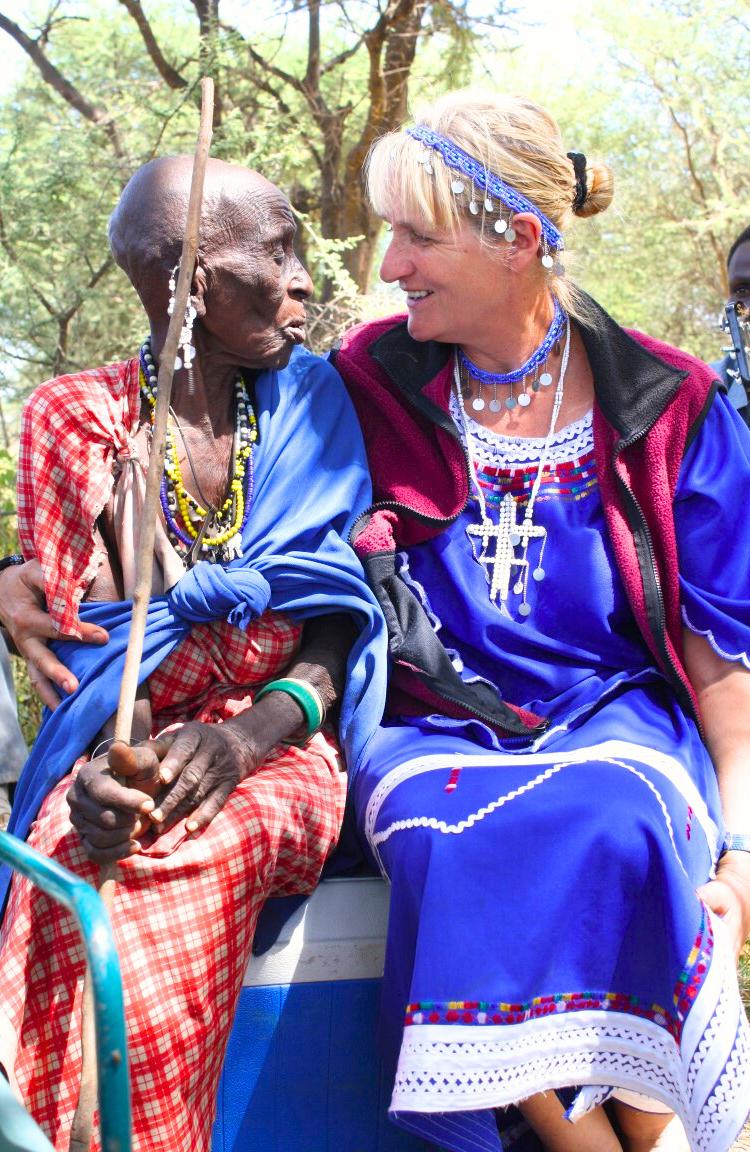
In 1983, she left Germany for Tanzania during a time of economic hardship, where fuel was scarce, cars were few, and basic commodities were considered luxuries.
“I stayed and slept in my car at a gas station for three days for lack of fuel,” she highlights. “Getting commodities like a roll of toilet paper and sugar was considered a luxury because all supermarkets were empty.”
Her partnership with MAF commenced in early 1990s, where she joined the Malambo safari to access Malambo, allowing her to establish various vital projects, including schools, an orphanage, women’s initiatives, and evangelistic work.
Additionally, Angelika has been spearheading an agricultural project to teach the community sustainable farming practices for food security.
Angelika’s deep commitment to providing medical care led her to establish mobile clinics in remote villages. Beneath the shade of trees, she shielded the villagers from the scorching sun while offering much-needed medical assistance. Medicine supplies were rare in the city, prompting Angelika to travel long distances to procure them from the government and other sources.
Accompanied by a doctor from Selian Lutheran Hospital, Ngaramtoni, and a dedicated volunteer, Angelika traversed from one village to another, offering healthcare services, spreading the teachings of Jesus Christ, and promoting overall wellness. As dusk settled, they shared the Maasai people’s lives by sleeping in tents among them, forging a strong bond of trust and understanding.
Angelika’s compassionate efforts extended beyond healthcare. She established an orphanage, providing a nurturing environment for 32 children and granting them access to education through her schools.
During one of her clinics, Angelika encountered a woman pregnant with twins in a critical condition. While the mother successfully delivered one baby, she struggled to deliver the second, causing concern for her well-being.
15 | Flying for Life / SPRING 23 www.maf.org.nz TANZANIA
PHOTO / ANGELIKA WOHLENBERG
STORY / JACQUELINE MWENDE
In dire need of urgent medical intervention, Angelika utilized the only communication method available - a radio call.
“I made a call to MAF Tanzania office using my radio call, which was the only mode of communication then, requesting a medical evacuation for the distressed mother,” said Angelika. “Fortunately, an airstrip, renovated with the help of MAF pilots, was nearby, expediting the response.”
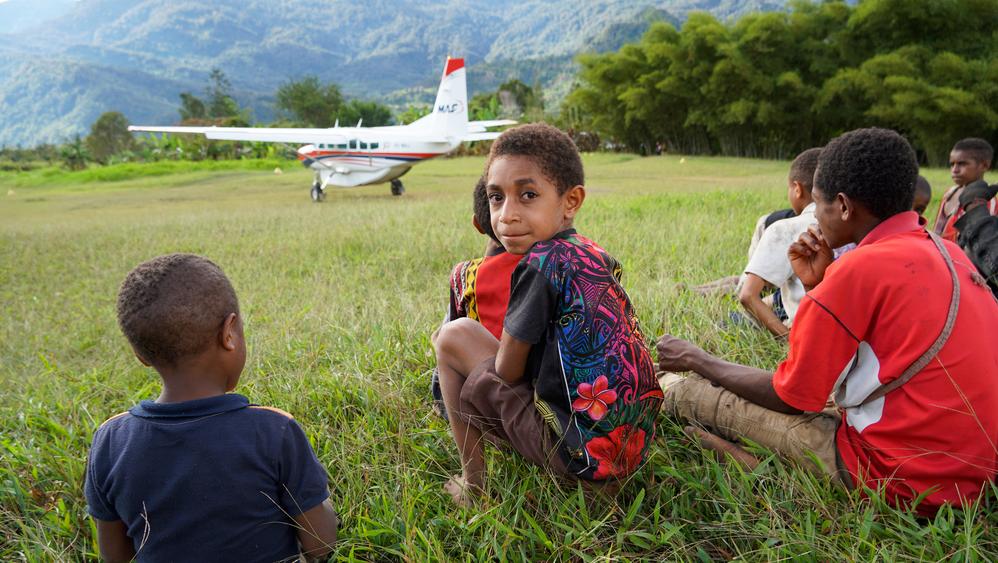
Within minutes, the MAF plane landed, and the woman, together with her firstborn, was swiftly transported to a Christian medical center for specialised care. Thanks to the timely intervention of the MAF plane, the second baby was safely delivered 24 hours later, bringing immense relief and gratitude to the mother.
In appreciation for the lives saved, the mother named one of her sons after the pilot, Andy, and the other after the doctor, Samuel, forever commemorating the heroic efforts of those involved.
Angelika’s unwavering dedication and selflessness have left an indelible mark on the Maasai community, embodying the spirit of compassion, and making a significant difference in the lives of those she touches. Her journey continues to inspire and uplift, showcasing the profound impact that a single individual can have on the lives of many.
Angelika’s organisation, Help for the Maasai, is a frequent flyer on the Malambo Safari, flying with us 11 times during the first half of 2023. Their project is based near to the Malambo airstrip which makes MAF a crucial air link for the volunteers there. This long-lasting partnership spans nearly two decades and has enabled Help for the Maasai to provide medical care and educational opportunities for the Maasai people in the long-term.
STAY CONNECTED
Stay up to date with all of the latest MAF NZ news and projects, and find how you can be a part of bringing help, healing and hope to the world’s most isolated communities.
www.maf.org.nz
Instagram: @maf_nz
Facebook: @mafnewzealand
To subscribe to our publications, visit: www.maf.org.nz/subscribe
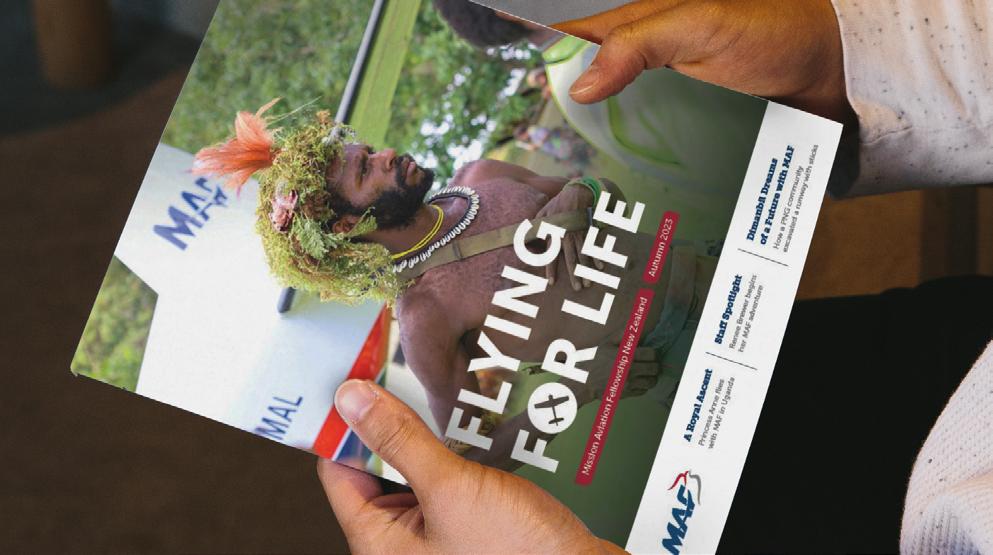
LEAVE A LEGACY
By remembering MAF in your Will, you will provide a lifeline beyond your lifetime to those who really need it - a promise of a better life for the isolated people MAF serves everyday.
Talk to your solicitor, or if you would like more information or a brochure, visit maf.org.nz/legacy
SPRING 23 / Flying for Life | 16
PHOTO / MANDY GLASS
Your eyes greedily search your young mummy’s face. What a Madonna moment. She has no idea how beautiful she looks, as she gazes at you, rapt. Your scrawny limbs poke out from your blanket, the skin hanging loosely off bird-like bones. We join in the worship, watching as she breast-feeds you.
We’re in a hut built on badlands that flood easily. The stench of receding toxic floodwaters mingles with the putrid mattress I’m sitting on. We slid-walked our way over the contaminated mud, stepping high over partly submerged coils of barbed wire. Brutal reminders of a 20-year-ago war, not removed, and lying in wait to pierce little bare feet. No-one comes here. This is the very back end of Tasi Tolu.
The doctors have discharged you, unable to procure you transfusions to give iron to your gaunt frame. Nobody knows why you can’t keep your milk down, why you are 2 months old, and miniscule. But as we listen, we learn that you vomit every 2 days, and never feed for long at a time. I watch you as you gulp air, and we discuss good latching (you don’t need to be a lactation consultant here to have something worthwhile to offer!) Then we bring up the taboo subject of burping a baby.
Mana & Baby Darius

Most newborns in Timor Leste are kept in the horizontal plane for at least a year. No-one knows the signs of gastric pain, of how a baby will pull its legs up and writhe uncomfortably, straining, crying. No-one wants to change the status quo. But we’ve already visited your mummy in hospital - so she trusts us - and now she is desperate. She called us this morning with the phone credit we gave her: SOS.
So we talk about how tiny tummies get full of air, and then can’t take in milk, or vomit it up. How milk needs space, and babies need nutrition. We discuss the ingrained belief that a baby would suffocate if held over the shoulder, and the fear of how to hold a baby any other way than prone; how a hand against chest or under chin and another hand along the back can well-support you. We discuss more new knowledge: that a breast needs to be drained to give maximum benefit to baby. We go slow, but the young girl’s face is still frowning as she tries to assimilate this difficult knowledge.
And then you burped!!! The most glorious sound imaginable of an “arrota!” (the onomatopoeiac Tetun for “burp”) Only an arrota could be this beautiful in the presence of such desperate malnutrition. This proof was exactly what was needed to start to dispel myths of fear, and to give you a future, and a hope.
“What does a concept of care look like in practice for MAF’s medevac patients in Timor-Leste?

This is something I am exploring as we aim to better serve our vulnerable patients and families within their unique cultural context. I have “jumped in the deep end” and started a Chaplaincy service to our medevacs in the national hospital, bridging ethnic and religious divides in order to reduce their fear in a stressful time, and to show the love of Christ in a myriad of practical ways.
In order to better serve our Timorese patients, and to train up local chaplains to continue this work in the future, I need to deepen the roots of my improvised Chaplaincy work through further study. I would welcome any available support as I seek to enroll in a Post-Graduate Diploma in Chaplaincy at Otago University.’
- RUTH HITCHINS
If you would like to financially support Ruth in her study at Otago University, please email us at info@maf.org.nz
19 | Flying for Life / AUTUMN 23 www.maf.org.nz TIMOR LESTE | Flying for Life / SPRING 23 www.maf.org.nz
STORY & PHOTO / RUTH HITCHINS, MAF Kiwi serving in Timor Leste
CARING FOR NEW MOTHERS & BABIES THROUGH ‘CLOSING THE LOOP’ IN TIMOR LESTE.
NEWS BRIEF
Philippines Disaster Response
In late July 2023 Typhoon Doksuri hit the Philippines. This typhoon arrived ahead of the harvest and at a time when the rice from the last harvest was nearly gone. It did not make direct landfall but the rain from the typhoon caused landslides, blocking roads, damaging bridges, and cutting off communities.
The MAF Disaster Response team has been working remotely with Ethnos 360 to contribute funds to cover the cost of flights to airlift foodstuffs and other necessities into these cut off communities. Ethnos 360 has also been rescuing stranded individuals and transporting personnel to places where relief operations have been hard to reach due to the widespread damage.

New MAFI CIO, Doug Ring
Doug and his wife, Kim, will be moving from the USA to the UK in September to be based in the MAF Ashford office. As Chief Information Officer, Doug will lead our organisational thinking around IT systems as we pursue our strategic objective of having a modern, fit-for-purpose IT system.
Doug grew up in Dhahran, Saudi Arabia, where his father worked in the oil industry. He has had a career working in the IT, Network Operations, Network Engineering and Staff business units of a major telecom company. His passion for mission has grown over the years since his second mission trip to South Sudan, and especially when he became a MAF US Advocate in 2021.
New MAF NZ Candidates: Cobus & Tronel van der Merwe
COMING UP WITH MAF NZ...

Touch & Go Event: Whitianga
November 17-19th 2023 (weather dependant)
Wing Over Wairarapa: Masterton
November 24-26th 2023
Festival One: Hartford, Karapiro
Cobus and Tronel, along with their children Isaac, Jana & Karlien are preparing to serve with MAFI in Papua New Guinea. Cobus will be stepping into the role of MAF International Corporate Services Manager.
Originally from South Africa, Cobus has previously owned and managed a telecommunication company which operated in Cameroon, Sierra Leone, Madagascar and Botswana. Tronel was involved in Missions in Zambia, Zimbabwe and Malawi while studying to be a cross-cultura; teacher. She is also qualified in New Zealand and South Africa as a Cardio-Physiologist.
They have spent the last 7 years in New Zealand, and have recently attained their NZ Citizenship which was a big answer to prayer. With their citizenship in place, they are now actively raising support to begin serving with MAF.
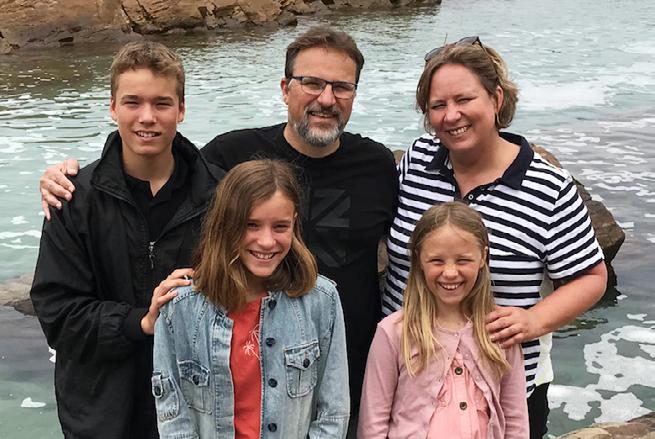
Support
January 26-29th 2024
MAF NZ Open Day: Kendon-Strong MAF Centre, Mount Maunganui
February 2024
SPRING 23 / Flying for Life | 18
our MAF Staff & Candidates by scanning the QR code or visit: www.maf.org.nz/ support-our-staff




for supporting the work of MAF NZ SCAN THE QR CODE TO DONATE www.maf.org.nz info@maf.org.nz 0800 87 85 88 PO Box 76502 Auckland 2241 New Zealand Flying for Life is the official magazine of Mission Aviation Fellowship NZ. Articles may be reprinted with acknowledgment Editor & Designer: Zoë Davies Printer: Roe Print Services ©MAF NZ Spring 2023 DONATE TO KEEP OUR PLANES FLYNG MAF WEBSITE DONATE PAGE DIRECT BANK TRANSFER Scan the QR code or go to MAF.ORG.NZ/DONATE to give via debit/credit card. Recurring giving option available. Give directly to our Bank Account: 06 0583 0528842 01 Please include the reference: Mag23















 - MATT HENDERSON, MAF Arnhem Land Country Director
- MATT HENDERSON, MAF Arnhem Land Country Director






























